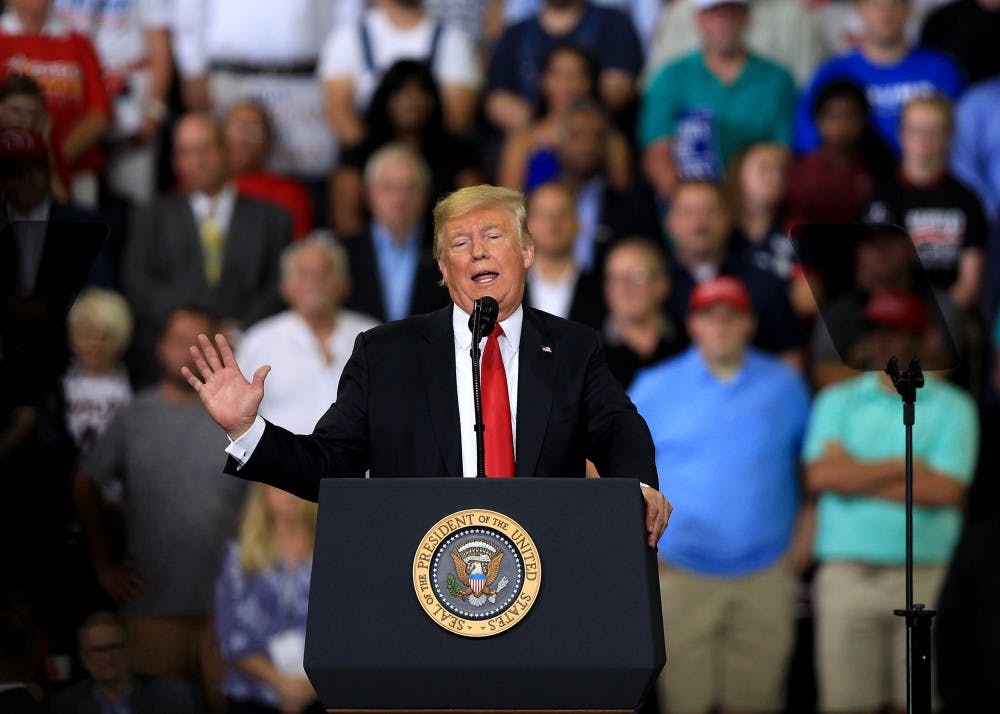The fourth National Climate Assessment, released in November 2018, predicted effects of climate change could cut up to 10% of the country’s gross domestic product by 2100.
But according to reporting this week by the New York Times, the Trump administration has ordered future projections to stop at 2040, instead of 2100. This would reduce the projected impacts of climate change in a move many see as an effort to stifle work to combat climate change.
While the decision has a direct effect on climate scientists within the government, it could also affect broader work to publicize the effects of climate change and prepare for the impacts.
“People will start questioning the projections up to 2100 and/or think that action doesn’t need to be taken,” said Gabriel Filippelli, an IU-Purdue University Indianapolis professor and member of IU's Environmental Resilience Institute.
Most increases in the drivers of climate change such as temperature are exponential, Filippelli said. This means effects in 2100 are projected to be significantly worse than in 2040.
Many scientists suspect the Trump administration is trying to limit the scope of assessments — removing worst-case scenario projections — in an attempt to shield itself from legal consequences and policy implications of showing extreme impacts of climate change, Filippelli said.
“I think it’s really short-sighted because it makes it more difficult to see the consequences of our actions and how they play out over the long run, and it makes it more difficult to plan for the long term,” said Jeffrey Dukes, director of Purdue Climate Change Research Center.
Research outside the government will continue projecting until 2100, Dukes said. But the administration has made it more difficult for climate change research than in recent memory, cutting federal funding opportunities from agencies such as the Environmental Protection Agency.
Filippelli said he has already been affected by these funding cuts.
Private foundations are attempting to fill in funding gaps, he said. And some federal agencies not under the executive branch are continuing as usual with funding distributed by Congress, such as the National Science Foundation.
“It’s not something that the administration is able to stop,” Dukes said. “But they’re certainly doing their best to slow it down and to slow down related policies.”
In 2017 IU launched its Environmental Resilience Institute, part of a $55 million Prepared for Environmental Change Grand Challenges program.
More than 100 researchers affiliated with the ERI are working to predict effects of environmental change and help prepare businesses, farmers, communities and individuals within the state, according to the ERI's website.
Some say limiting the scope of science research is the most recent action by the Trump administration to undermine work on climate change.
Janet McCabe, assistant director of policy and implementation at the ERI and an Obama-era EPA official, said some policy decisions can be reversed easily, with the main impact being a loss of four years of work.
But McCabe and her colleagues see other decisions regarding approaches to policy as more dangerous for the long term.
“Now is not a time to lose four years, because of the snowballing effect of climate change,” she said.
McCabe shaped and implemented Clean Air Act standards as assistant administrator for the Office of Air and Radiation at the EPA from 2013 to 2017.
One area concerning McCabe and others is defunding scientific parts of the EPA, risking job cuts that could drive away people with institutional knowledge and expertise.
Another area of concern involves changes to methodologies and approaches. For instance, the administration is taking a different approach to doing cost-benefit analysis, which McCabe said tends to devalue health benefits and make costs to industry appear more substantial in comparison.
These types of subtle, buried changes cut to the root of how agencies do business, McCabe said.
“If they get embedded in the way the agencies do things, then it can be harder for them to switch back the other way,” McCabe said. “Not impossible.”
There’s also a risk agencies could lose credibility with courts, lawmakers and the public, McCabe said. She said she hopes four years of a Trump administration will not compromise the EPA’s credibility, but it is an area of worry, nonetheless.
“Once your reputation for honesty is compromised, it’s really hard to get it back,” she said.




